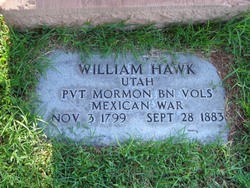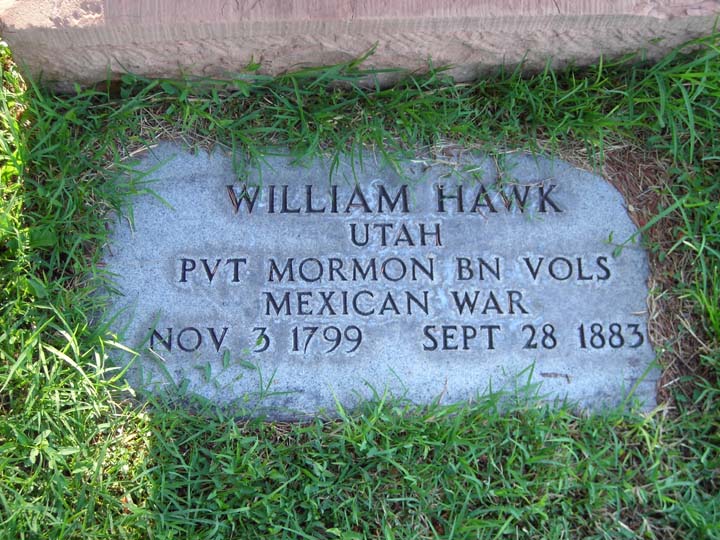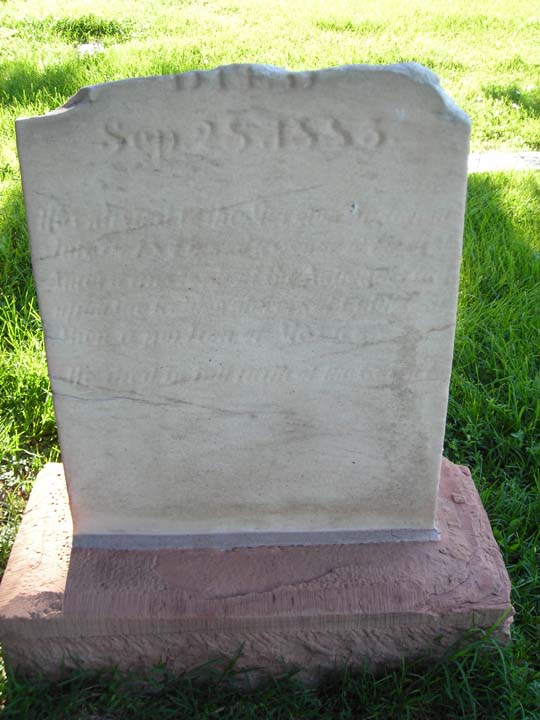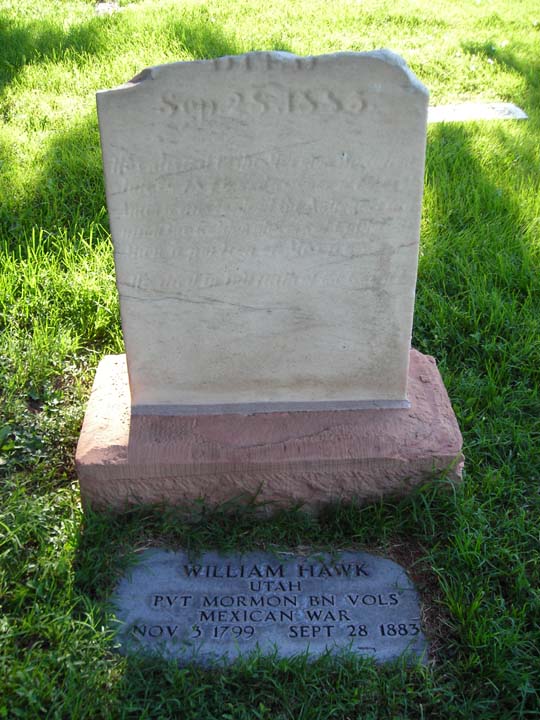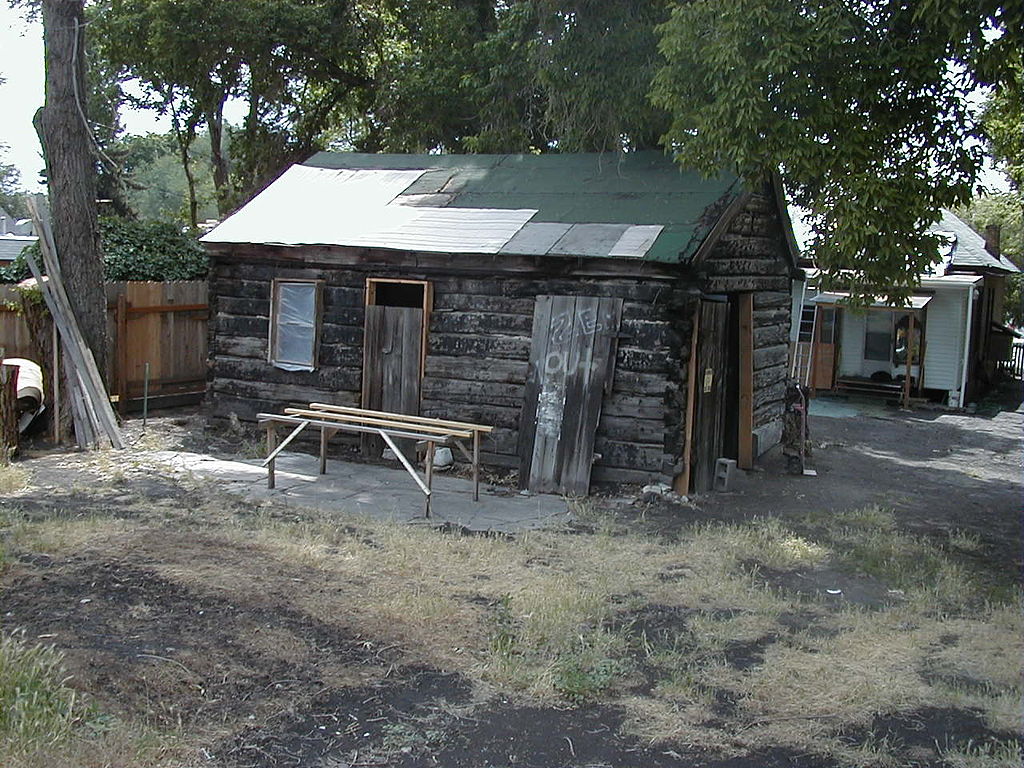A friend of the late Elder William Hawk, of the Nineteenth Ward, familiarly known to the early settlers of Utah as Father Hawk, hands to us a report of his useful and exemplary career. From it, we learn that the faithful veteran was born in the state of Pennsylvania on the third day of November, 1799, was baptized into the Church Of Jesus Christ of Latter-day Saints, by Elder Moses Harris, in the year of 1834, and was ordained to the office of an Elder at the same time. He removed to Kirtland, Ohio, soon after his baptism, and took an active part in the labors of the building up of that Stake and the first Temple erected in this generation unto the name of the Lord.
When the Saints were compelled to abandon Kirtland, he removed to Missouri, and from thence suffered mobbings, driving persecution and affliction with the people of God, until he moved with his family to Montrose, Iowa, opposite Nauvoo, whence also with the Saints he was forced to remove and went on to Council Bluffs in the spring of 1846.
On the 16 day of July, 1846, he and his son Nathan, enlisted as members of the Mormon Battalion and shared all the long and dreary march through the wilds of Kansas and New Mexico to the Pacific Coast. He was one of the first Americans to plant the national flag upon the golden shores of California, then a portion of Mexico.
Accompanied by his son, Nathan, and given the authority to convey the U. S. mail overland to Missouri, and thus from California to the western front. (They were hired by Samuel Brannon to carry private mail from California eastward. In this mail run the newspaper announcing the finding of gold was first reported to the eastern part of the country. GBB) Returning from Missouri, after faithfully delivering the mail at Independence, Missouri, he settled in Salt Lake City in 1849, and was appointed to the Las Vegas Mission in 1856.
With the company of the "Silver Grays" he marched into Echo Canyon in the fall of 1857 and returned to Salt Lake City the same fall, and in the following spring, he moved to Payson, thus being the season of the move of the Saints to the south. He returned to Salt Lake City in the summer of 1858, where he resided until the day of his death, September 3, 1883. He has surviving him four daughters in Utah and two sons somewhere in the States of whom nothing definite is known. He has 23 grandchildren living and 11 great grandchildren. He was ordained a member of the 35th Quorum of Seventies the 17 July, 1850, and was afterward ordained a President of the same Quorum and remained so until the day of his death.
Father Hawk was a devoted Latter-Day Saint, steady, zealous, and unflinching. His religion, with him, was uppermost, first, last and all times, and he has gone to join the throngs of the redeemed, who have come up through great tribulation and washed their robes and made them white in the blood of the lamb.
On the 6th and 7th day of February, 1855 at a Grand Festival of the Battalion William Hawk remarked:
"Brethern and Sisters-- I want to bear testimony to one saying that has been thrown out here, viz:that the President promised the Battalion, that is a much that they go forth and do right there should not be a ball shot at the; and I can say for one that I realized the truth of that saying, I have experienced it--I have seen those words fulfilled and that promise verified to the very letter, when placed in the midst of my enemies with nothing but these little mallets to defend myself with (the speaker here exhibited his fists) and they were all well armed with bows and arrows, knives and rifles, but they burnt the priming, the powder flashing in the pan, and not a gun aimed at me went off, and their arrows broke."
"When Brigham Young said he wanted us to go I put my name down to go for one, and the Indians did not kill me. I had to leave my family at the Bluffs, my wife in a very weakly state of health. I had five children and the oldest went with me to California, and he is now in Sacrament City. On my return, I brought my wife and was coming to this place she got killed at Ash Hollow, in a stampede, and her body is laid by the road side. I wish to make honorable mention of her, for she was a noble woman. The rest of my family are here and rejoicing in the truth, and I feel thankful for the blessings that have attended me; and I feel to wish I may ever pour out my soul to God for a continuance of His blessings. And I do not wish my services in the Battalion to be the last good deed of my life; I want to be ready and to be on hand come what will."
"The Mormon Battalion", By Daniel Tyler page 363
A friend of the late Elder William Hawk, of the Nineteenth Ward, familiarly known to the early settlers of Utah as Father Hawk, hands to us a report of his useful and exemplary career. From it, we learn that the faithful veteran was born in the state of Pennsylvania on the third day of November, 1799, was baptized into the Church Of Jesus Christ of Latter-day Saints, by Elder Moses Harris, in the year of 1834, and was ordained to the office of an Elder at the same time. He removed to Kirtland, Ohio, soon after his baptism, and took an active part in the labors of the building up of that Stake and the first Temple erected in this generation unto the name of the Lord.
When the Saints were compelled to abandon Kirtland, he removed to Missouri, and from thence suffered mobbings, driving persecution and affliction with the people of God, until he moved with his family to Montrose, Iowa, opposite Nauvoo, whence also with the Saints he was forced to remove and went on to Council Bluffs in the spring of 1846.
On the 16 day of July, 1846, he and his son Nathan, enlisted as members of the Mormon Battalion and shared all the long and dreary march through the wilds of Kansas and New Mexico to the Pacific Coast. He was one of the first Americans to plant the national flag upon the golden shores of California, then a portion of Mexico.
Accompanied by his son, Nathan, and given the authority to convey the U. S. mail overland to Missouri, and thus from California to the western front. (They were hired by Samuel Brannon to carry private mail from California eastward. In this mail run the newspaper announcing the finding of gold was first reported to the eastern part of the country. GBB) Returning from Missouri, after faithfully delivering the mail at Independence, Missouri, he settled in Salt Lake City in 1849, and was appointed to the Las Vegas Mission in 1856.
With the company of the "Silver Grays" he marched into Echo Canyon in the fall of 1857 and returned to Salt Lake City the same fall, and in the following spring, he moved to Payson, thus being the season of the move of the Saints to the south. He returned to Salt Lake City in the summer of 1858, where he resided until the day of his death, September 3, 1883. He has surviving him four daughters in Utah and two sons somewhere in the States of whom nothing definite is known. He has 23 grandchildren living and 11 great grandchildren. He was ordained a member of the 35th Quorum of Seventies the 17 July, 1850, and was afterward ordained a President of the same Quorum and remained so until the day of his death.
Father Hawk was a devoted Latter-Day Saint, steady, zealous, and unflinching. His religion, with him, was uppermost, first, last and all times, and he has gone to join the throngs of the redeemed, who have come up through great tribulation and washed their robes and made them white in the blood of the lamb.
On the 6th and 7th day of February, 1855 at a Grand Festival of the Battalion William Hawk remarked:
"Brethern and Sisters-- I want to bear testimony to one saying that has been thrown out here, viz:that the President promised the Battalion, that is a much that they go forth and do right there should not be a ball shot at the; and I can say for one that I realized the truth of that saying, I have experienced it--I have seen those words fulfilled and that promise verified to the very letter, when placed in the midst of my enemies with nothing but these little mallets to defend myself with (the speaker here exhibited his fists) and they were all well armed with bows and arrows, knives and rifles, but they burnt the priming, the powder flashing in the pan, and not a gun aimed at me went off, and their arrows broke."
"When Brigham Young said he wanted us to go I put my name down to go for one, and the Indians did not kill me. I had to leave my family at the Bluffs, my wife in a very weakly state of health. I had five children and the oldest went with me to California, and he is now in Sacrament City. On my return, I brought my wife and was coming to this place she got killed at Ash Hollow, in a stampede, and her body is laid by the road side. I wish to make honorable mention of her, for she was a noble woman. The rest of my family are here and rejoicing in the truth, and I feel thankful for the blessings that have attended me; and I feel to wish I may ever pour out my soul to God for a continuance of His blessings. And I do not wish my services in the Battalion to be the last good deed of my life; I want to be ready and to be on hand come what will."
"The Mormon Battalion", By Daniel Tyler page 363
Family Members
Advertisement
Explore more
Sponsored by Ancestry
Advertisement
